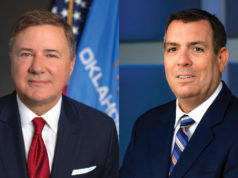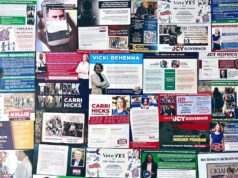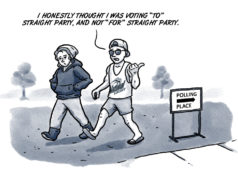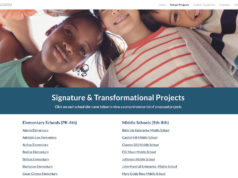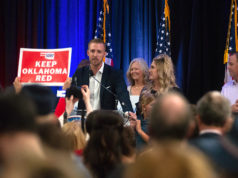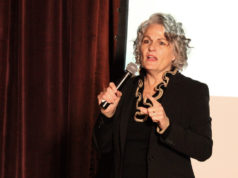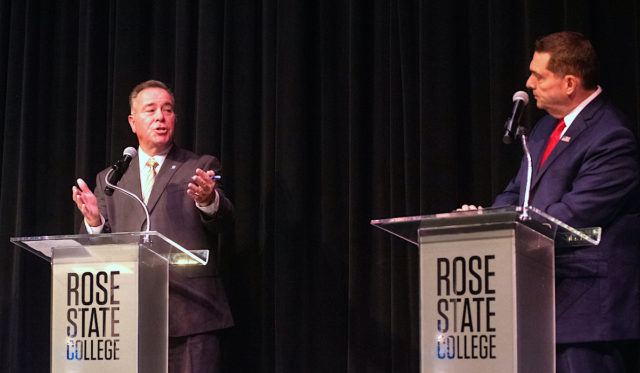
(Editor’s note: This post was produced in partnership with the Oklahoma nonprofit newsroom The Frontier.)
Republican contenders for state treasurer debated Tuesday, Aug. 16, at an event hosted by NonDoc and News 9 at Rose State College in Midwest City. The Frontier used public records, interviews and other sources to fact-check some of the candidates’ claims from the debate.
Former Sen. Clark Jolley (R-Edmond) and outgoing Rep. Todd Russ (R-Cordell), will compete for the Republican nomination for state treasurer in a runoff election today. The winner will face Democrat Charles De Coune and Libertarian Gregor J. Sadler in the November general election.
Read NonDoc’s recap of the debate or watch the full event here.
Claims: Native Americans have a genetic predisposition to alcohol abuse, and a 2016 controversy over remarks Russ made in the Oklahoma Legislature on the subject was created by out-of-state special interest groups who misrepresented his statements.
Russ said: “The people that got upset about that were some out-of-state special interest groups, physicians sent them bad information. The people that heard what I said were very compassionate, very understanding, knew exactly what I was saying. I was defending the Native Americans and all the other — any minorities and Americans that have these genetic dispositions that caused them to have an alcohol problem.”
Fact Check: Mostly False
Some people can be biologically predisposed to alcoholism, but studies have shown genetic factors for Native Americans are similar to those found in other populations.
Past trauma and other environmental factors can also play a role in whether someone develops a substance use disorder.
During a 2016 debate in the Legislature over a bill that paved the way for strong beer and wine in grocery and convenience stores, Russ said Native Americans “cannot process that (alcohol) like other people.”
Local groups, including the House Native American Caucus and the Cherokee Nation condemned Russ’ remarks, as did then-Rep. Dan Kirby (R-Tulsa), who is a citizen of the Muscogee Nation. Russ apologized, saying his comments were based on “outdated information.”
— Brianna Bailey
Claim: A tax increase the Oklahoma Legislature passed in 2018, which Russ voted for, didn’t exclusively go to fund teacher pay raises.
Jolley said: “That money wasn’t directed on the tax increase to pay teachers. It was directed to fund the state government and that’s what Rep. Russ voted for. (…) It wasn’t a tax increase to fund teachers. It was a tax increase to fund a bloated government.”
Fact check: True but misleading
The historic package of tax increases approved by the Legislature before a teacher walkout in 2018 did go to fund pay raises of roughly $6,100 per teacher, according to the State Department of Education.
But it’s true that the main tax bill, House Bill 1010XX, did not specifically direct the new tax revenue to only fund teacher pay raises. The bill, which increased taxes on cigarettes, motor fuel and gross production from oil and gas wells, directed money into the state’s General Revenue Fund, which is where most appropriations come from, including for education.
At the same time in 2018, the Legislature approved House Bill 1023XX, which increased the minimum salary schedule for teachers to include the raises, meaning the State Department of Education would have to receive funding to sustain the raises into the future.
Jolley said he took issue with the tax increase bill because it didn’t state that the tax increases would only fund teacher pay and a small portion went to state funds for things like county roads and bridges.
— Kayla Branch
Claim: An enforcement action that regulators initiated against Washita State Bank for unsafe and unsound banking practices in 2009 involved issues that arose after Todd Russ stepped down as CEO.
Russ said: “Because the date on that document is a year or more after I sold and left the bank. So any of the focus, the comments in that FDIC document are about the management after I left.”
Fact check: Mostly false
It’s true that the Federal Deposit Insurance Corporation filed an enforcement action against Washita State Bank in 2009, after Russ had stepped down as CEO. But the action was based on the bank’s finances in September 2008.
In an interview, Russ told The Frontier he left the bank in the summer of 2008. Some of the issues the regulators found at the bank dated as far back as 2007.
Under Russ’ leadership, Washita State Bank invested heavily in mortgage-backed securities tied to real estate in parts of the country that experienced significant declines in home values during the Great Recession. The FDIC later accused the bank of engaging in “unsafe and unsound banking practices.”
— Reese Gorman
Claim: Email communications between Jolley and the other two members of the Oklahoma Tax Commission in 2020 could not have violated the state Open Meetings Act because the commissioners did not take any official action.
Jolley said: “I don’t believe any action was being taken. And when you look at the nature of a three-person commission, that is one of the difficulties is how do you communicate, how much do you communicate? The law is very clear that no actions by the commission can take place in those instances.”
Fact check: Mostly false
Gov. Stitt’s former secretary of digital transformation and administration David Ostrowe in April called for special prosecutors to investigate alleged open meeting violations at the Oklahoma Tax Commission. Emails between Jolley, the other two commissioners and the Tax Commission’s attorney discussed Ostrowe and his alleged advocacy on behalf of a taxpayer. The emails also discussed putting an item on the commission’s next meeting agenda to talk about the issue in executive session.
The matter may eventually be decided by a court, but the Oklahoma Open Meeting Act and attorney general opinions are clear that any time a quorum of members of a public body discusses business, it must be at a public meeting. Public bodies can also meet behind closed doors in executive session under certain circumstances. While the law prohibits any action from occurring during informal meetings, it also goes a step further and states that such meetings may not be used “to decide any action.”
Joey Senat, a media professor at Oklahoma State University who specializes in open meetings and records, said public meetings are defined in law as any gathering of a majority of a public body where the business of the public body is being discussed, whether in person or through electronic means. A 2020 Attorney General opinion also states that any meeting “when a majority of members of a public body convenes to obtain information about a topic under the body’s purview, it is conducting business of the public body” and is subject to the Open Meeting Act.
“It’s pretty clear they can’t discuss public business outside a public meeting,” Senat said. “It doesn’t matter if they did it by email or by conference call, they were still communicating and discussing something the Tax Commission was going to deal with.”
— Clifton Adcock
Rating system:
True: A claim that is backed up by factual evidence
Mostly true: A claim that is mostly true but also contains some inaccurate details
Mixed: A claim that contains a combination of accurate and inaccurate or unproven information
True but misleading: A claim that is factually true but omits critical details or context
Mostly false: A claim that is mostly false but also contains some accurate details
False: A claim that has no basis in fact










